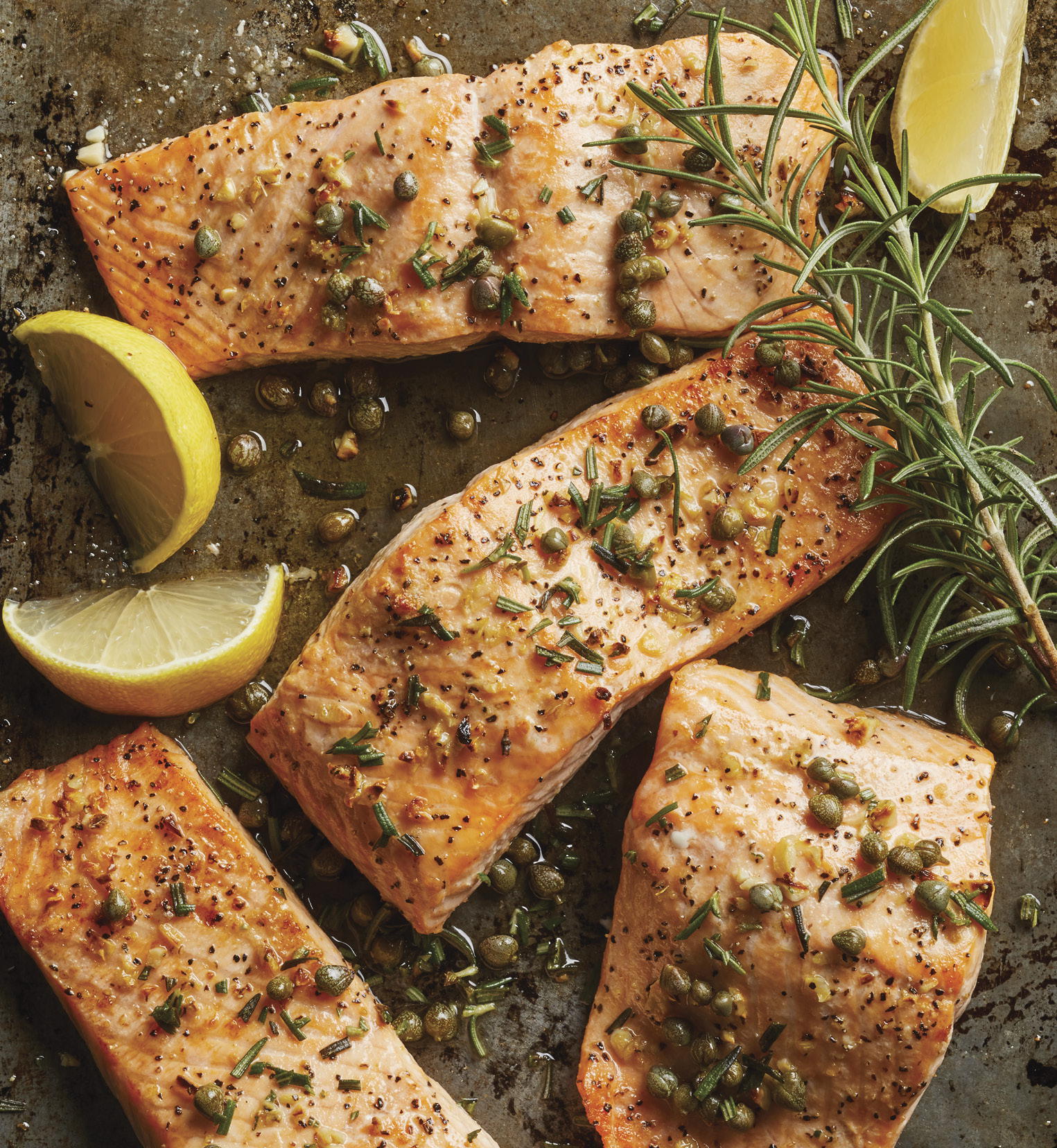cooking fish & seafood
Find the techniques, timings, and temperatures you need to know when cooking fish and seafood. (Find fish and seafood recipes Roasted Fish, Fish and Chips, and Boiled Lobster.)
guide to fish
Freshwater Fish
Catfish
Market Form: Whole, fillets, steaks
Texture: Firm
Flavor: Mild
Substitutions: Grouper, rockfish, sea bass, tilapia
Lake trout (North American char)
Market Form: Whole, fillets, steaks
Texture: Slightly firm
Flavor: Moderate
Substitutions: Pike, sea trout, whitefish
Rainbow trout
Market Form: Fillets
Texture: Slightly firm
Flavor: Delicate
Substitutions: Salmon, sea trout
Tilapia
Market Form: Whole, dressed, fillets
Texture: Slightly firm
Flavor: Delicate
Substitutions: Catfish, flounder, orange roughy
Whitefish
Market Form: Whole, fillets
Texture: Moderately firm
Flavor: Delicate
Substitutions: Cod, lake trout, salmon, sea bass
Saltwater Fish
Atlantic ocean perch (redfish)
Market Form: Whole, fillets
Texture: Slightly firm
Flavor: Mild
Substitutions: Orange roughy, rockfish, snapper
Cod
Market Form: Fillets, steaks
Texture: Moderately firm
Flavor: Delicate
Substitutions: Flounder, haddock, pollock
Flounder
Market Form: Whole, fillets
Texture: Fine
Flavor: Delicate to mild
Substitutions: Cod, orange roughy, sea trout, sole, whitefish, whiting
Grouper
Market Form: Whole, dressed, fillets
Texture: Moderately firm
Flavor: Mild
Substitutions: Mahi mahi, sea bass
Haddock
Market Form: Fillets
Texture: Moderately firm
Flavor: Delicate
Substitutions: Cod, grouper, halibut, lake trout, sole, whitefish, whiting
Halibut
Market Form: Fillets, steaks
Texture: Firm
Flavor: Delicate
Substitutions: Cod, grouper, red snapper, sea bass
Mackerel
Market Form: Whole
Texture: Delicate
Flavor: Pronounced
Substitutions: Mahi mahi, swordfish, tuna
Mahi mahi (dolphinfish)
Market Form: Whole, fillets
Texture: Firm
Flavor: Mild to moderate
Substitutions: Grouper, orange roughy, red snapper
Orange roughy
Market Form: Fillets
Texture: Moderately firm
Flavor: Delicate
Substitutions: Cod, flounder, haddock, ocean perch, sea bass, sole
Red snapper
Market Form: Whole, fillets
Texture: Moderately firm
Flavor: Mild to moderate
Substitutions: Grouper, lake trout, ocean perch, rockfish, whitefish
Rockfish
Market Form: Whole, fillets
Texture: Slightly firm
Flavor: Mild to moderate
Substitutions: Cod, grouper, ocean perch, red snapper
Salmon
Market Form: Whole, fillets, steaks
Texture: Moderately firm
Flavor: Mild to moderate
Substitutions: Rainbow trout, swordfish, tuna, arctic char
Shark (mako)
Market Form: Fillets, steaks
Texture: Firm, dense
Flavor: Moderate
Substitutions: Swordfish, tuna
Sole
Market Form: Fillets
Texture: Fine
Flavor: Delicate
Substitutions: Flounder, haddock, halibut, pollock
Swordfish
Market Form: Loins, steaks
Texture: Firm, dense
Flavor: Mild to moderate
Substitutions: Halibut, shark, tuna
Tuna
Market Form: Loins, steaks
Texture: Firm
Flavor: Mild to moderate
Substitutions: Mackerel, salmon, shark, swordfish

direct-grilling Fish
prep your fish or seafood by thawing if frozen. (Rinse only if necessary.) Pat dry with paper towels. Place fish fillets in a well-greased grill basket. For fish steaks and whole fish, grease grill rack. Thread scallops or shrimp on skewers, leaving a ¼-inch space between pieces.
for a charcoal or gas grill, grill fish, covered, over medium heat (tips, Grilling) for the time given (left) or until fish flakes when tested with a fork (seafood should look opaque), turning once halfway through grilling. If desired, brush with vegetable oil or melted butter after turning.
direct-grilling fish
Dressed whole fish
Thickness/Weight: ½ to 1½ lb.
Grilling Temperature: Medium
Direct-Grilling Time*: 6 to 9 minutes per 8 oz.
Doneness: Flakes
Fillets, steaks, cubes (for kabobs)
Thickness/Weight: ½ to 1 inch thick
Grilling Temperature: Medium
Direct-Grilling Time*: 4 to 6 minutes per ½-inch thickness
Doneness: Flakes
Lobster tails
Thickness/Weight: 6 to 8 oz.
Grilling Temperature: Medium
Direct-Grilling Time*: 10 to 12 minutes
Doneness: Opaque
Lobster tails
Thickness/Weight: 6 to 8 oz.
Grilling Temperature: Medium
Direct-Grilling Time*: 12 to 15 minutes
Doneness: Opaque
Sea scallops (for kabobs)
Thickness/Weight: 12 to 15 per lb.
Grilling Temperature: Medium
Direct-Grilling Time*: 5 to 8 minutes
Doneness: Opaque
Shrimp (for kabobs)
Thickness/Weight: 20 per lb.
Grilling Temperature: Medium
Direct-Grilling Time*: 5 to 8 minutes
Doneness: Opaque
Shrimp (for kabobs)
Thickness/Weight: 12 to 15 per lb.
Grilling Temperature: Medium
Direct-Grilling Time*: 7 to 9 minutes
Doneness: Opaque
*All cooking times are based on fish or seafood removed directly from refrigerator.

indirect- grilling fish
prep your fish as directed opposite.
for a charcoal or gas grill, prepare grill for indirect cooking using a drip pan (tips, Grilling). Place fish over drip pan. Grill, covered, over indirect medium heat for the time given (right) or until fish begins to flake when tested with a fork (seafood should look opaque), turning once halfway through grilling if desired. If desired, brush with vegetable oil or melted butter after turning.
indirect-grilling fish
Dressed fish
Thickness, Weight, or Size: ½ to 1½ lb.
Grilling Temperature: Medium
Indirect-Grilling Time*: 15 to 20 minutes per 8 oz.
Doneness: Flakes
Fillets, steaks, cubes (for kabobs)
Thickness, Weight, or Size: ½ to 1 inch thick
Grilling Temperature: Medium
Indirect-Grilling Time*: 7 to 9 minutes per ½-inch thickness
Doneness: Flakes
Sea scallops (for kabobs)
Thickness, Weight, or Size: 12 to 15 per lb.
Grilling Temperature: Medium
Indirect-Grilling Time*: 11 to 14 minutes
Doneness: Opaque
Shrimp (for kabobs)
Thickness, Weight, or Size: 20 per lb.
Grilling Temperature: Medium
Indirect-Grilling Time*: 8 to 10 minutes
Doneness: Opaque
Shrimp (for kabobs)
Thickness, Weight, or Size: 12 to 15 per lb.
Grilling Temperature: Medium
Indirect-Grilling Time*: 9 to 11 minutes
Doneness: Opaque
*All cooking times are based on fish or seafood removed directly from refrigerator.

selecting
Pick fresh fish with firm flesh and a fresh and mild scent (not fishy or sour). Download the app about sustainable fish at seafoodwatch.org.
storing
Refrigerate fish in original packaging 1 to 2 days. For more storage info on shellfish.
freezing
Wrap fresh fish in freezer wrap or foil. Freeze 3 to 6 months (never refreeze fish).
thawing
Thaw in a container in the refrigerator overnight. For more storing, freezing, and thawing info, Storage & Safety.
cooking fish
fish skin may have a few remaining scales when you purchase it. Before cooking fish with the skin on, scrape away any scales that remain. Or, if desired, remove the skin or have it removed at the market.
pin bones may occasionally remain in larger fish even if they were deboned at the market. Remove these with a clean pair of needle-nose pliers dedicated for kitchen use only. Pull out the pin bones at a 45-degree angle toward where the head would be.
TIMING is everything when it comes to cooking fish. To best estimate the cooking time, weigh dressed fish or use a ruler to measure the thickness of fillets and steaks. Properly cooked fish is opaque, flakes when tested with a fork, and readily comes away from the bones; the juices should be a milky white. If you like, serve with one of the sauces.
doneness is tested by inserting a fork into the fish and gently twisting. If the fish easily flakes, it is done. Check fish at the minimum cooking time to prevent overcooking.
cooking fish
Bake
Preparation: Place fish in a single layer in a greased shallow baking pan. For fillets, tuck under any thin edges. Brush with olive oil or melted butter.
Fresh or Thawed Fillets or Steaks: Bake, uncovered, in a 450°F oven 4 to 6 minutes per ½-inch thickness of fish.
Dressed: Bake, uncovered, in a 350°F oven 6 to 9 minutes per 8 oz. of fish.
Broil
Preparation: Preheat broiler. Place fish on greased unheated rack of a broiler pan. For fillets, tuck under any thin edges. Brush with vegetable oil or melted butter.
Fresh or Thawed Fillets or Steaks: Broil 4 inches from the heat 4 to 6 minutes per ½-inch thickness of fish. If fish is 1 inch or more thick, turn once halfway through broiling time.
Dressed: Not recommended.
Grill
Preparation: See Direct-Grilling and Indirect-Grilling Fish charts.
Poach
Preparation: Add 1½ cups water, broth, or wine to a 10-inch skillet. Bring to boiling. Add the fish. Return to boiling; reduce heat.
Fresh or Thawed Fillets or Steaks: Simmer, uncovered, 4 to 6 minutes per ½-inch thickness of fish.
Dressed: Simmer, covered, 6 to 9 minutes per 8 oz. of fish.
Skillet-cook
Preparation: In a 12-inch skillet melt 1 Tbsp. butter and 1 Tbsp. vegetable oil over medium-high heat.
Fresh or Thawed Fillets or Steaks: Add fish and cook 4 to 6 minutes per ½-inch thickness of fish, turning carefully halfway through.
Dressed: Not recommended.


preparing & cooking shellfish
Clams
Amount Per Serving: 6 in shells (info, Shellfish)
Preparation: Scrub live clams under cold running water. For 24 clams in shells, in an 8-qt. pot combine 4 qt. cold water and ⅓ cup salt. Add clams and soak 15 minutes; drain and rinse. Discard water; repeat.
Cooking: For 24 clams in shells, add ½ inch water to an 8-qt. pot; bring to boiling. Place clams in a steamer basket. Steam, covered, 5 to 7 minutes or until clams open. Discard any that do not open.
Crabs, hard-shell
Amount Per Serving: 1 lb. live
Preparation: Grasp live crabs from behind, firmly holding the back two legs on each side. Rinse under cold running water.
Cooking: To boil 3 lb. live hard-shell blue crabs, in a 12- to 16-qt. pot bring 8 qt. water and 2 tsp. salt to boiling. Add crabs. Simmer, covered, about 10 minutes or until crabs turn pink; drain.
Crawfish
Amount Per Serving: 1 lb. live
Preparation: Rinse live crawfish under cold running water. For 4 lb. crawfish, in a 12- to 16-qt. pot combine 8 qt. cold water and ⅓ cup salt. Add crawfish and soak 15 minutes; rinse and drain.
Cooking: For 4 lb. live crawfish, in a 12- to 16-qt. pot bring 8 qt. water and 2 tsp. salt to boiling. Add crawfish. Simmer, covered, 5 to 8 minutes or until shells turn red; drain.
Lobster tails (To boil a live lobster, see Boiled Lobster.)
Amount Per Serving: One 8-oz. frozen
Preparation: Thaw frozen lobster tails in the refrigerator.
Cooking: For four 8-oz. lobster tails, in a 3-qt. saucepan bring 6 cups water and 1½ tsp. salt to boiling; add tails. Simmer, uncovered, 8 to 12 minutes or until shells turn bright red and meat is tender; drain.
Mussels
Amount Per Serving: 12 in shells (info, Shellfish)
Preparation: Scrub live mussels under cold running water. Using your fingers, pull out beards that are visible between the shells.
Cooking: For 24 mussels, add ½ inch water to an 8-qt. pot; bring to boiling. Place mussels in a steamer basket. Steam, covered, 5 to 7 minutes or until shells open. Discard any that do not open.
Oysters
Amount Per Serving: 6 in shells (info, Shellfish)
Preparation: Scrub live oysters under cold running water. For easier shucking, chill. To shuck, hold oyster in a heavy towel or mitt. Carefully insert oyster knife tip into hinge between shells. Move blade along inside of upper shell to free the muscle; twist knife to pry shell open. Slide knife under oyster to cut muscle from bottom shell.
Cooking: For 2 pt. shucked oysters, rinse oysters; pat dry with paper towels. In a 10-inch skillet cook and stir oysters in 1 Tbsp. hot butter over medium heat 3 to 4 minutes or until oyster edges curl; drain.
Shrimp
Amount Per Serving: 6 oz. in shells or 3 to 4 oz. peeled, deveined (info, Shellfish)
Preparation: To peel, open shell down the underside. Starting at head end, pull back the shell. Gently pull on the tail to remove. Use a sharp knife to remove the black vein that runs along center of back. Rinse under cold running water.
Cooking: For 1 lb. shrimp, in a 3-qt. saucepan bring 4 cups water and 1 tsp. salt to boiling. Add shrimp. Simmer, uncovered, 1 to 3 minutes or until shrimp turn opaque, stirring occasionally. Rinse under cold running water, drain, and, if desired, chill.